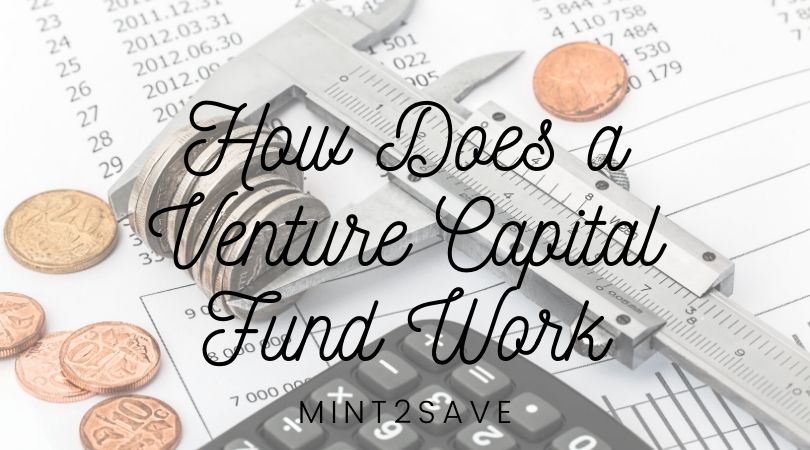How does a Venture Capital Fund work?
- 20 March 2020 | 2313 Views | By Abhinav Mishra

When anyone starts a new business, they definitely need money to get it off the ground (amongst all other things). To operate any business one needs the money to rent or purchase a place to operate from for the business, furniture and equipment, supplies, etc. Then a business eventually may even need money to pay to its employees. There are several places where one can get the money that a new business needs, one of those being a Venture capital fund.
Despite its intimidating nature, venture capital funding still remains a very popular and attractive option for businesses who have been refused finance from other sources of traditional lenders and even for entrepreneurs looking to scale quickly with a firm eye on a subsequent rewarding exit.
What is a Venture Capital Fund?
A venture capital fund is an investment fund made up of contributions from wealthy or high net worth individuals or companies, who give their money to a Venture Capital firm to manage investment portfolio on their behalf and to invest in high-risk start-ups in exchange for an equity stake in the company. All investors are made aware of what funds or businesses their money is being invested into, as well as the potential risks and rewards of such investments so that they can make an informed decision.
Although 10 or 15 years ago venture capital funding was exclusively reserved for only a selected number of few start-ups with considerable growth potential or a wealth of good connections, but lately the recent years have witnessed a surge in the finance available for businesses of all sizes and sectors. Venture money is not intended to be invested for the long-term. The whole point is to invest in a company’s balance sheet and assets until it reaches an adequate size and credibility so that it can be sold to a corporation or so that later the institutional public-equity markets can step in and provide liquidity. In crux, the venture capitalist buys a stake in an entrepreneur’s idea, nurtures it for a short period of time, and then exits with the help of an investment banker to be handed over to public or other funds.
Venture capital bridges the gap between the required sources of funds for innovation (which mainly includes corporations, government bodies, and the entrepreneur’s friends and family) and conventional, lower-cost sources of capital available to the ongoing concerns. To fill that void successfully it is required by the venture capital industry to provide a sufficient return on capital to attract private equity funds, attractive returns for its own contributors, and adequate upside potential to entrepreneurs to entice high-quality ideas that will generate higher returns. The complete idea is to earn constantly superior return on investments from the inherently risky business ventures.
Venture capitalists and venture capital firms invest in all varied types of businesses. These could range from dotcom companies to biotech and peer-to-peer finance companies. The venture firm usually opens up a fund, takes in money from high net worth individuals, companies, and other funds, then invest that money into a number of smaller startup companies having growth potential or unique ideologies.
Who are the Investors in a Venture Capital Fund?
The investors in the venture capital funds usually include very large institutions such as pension funds, financial firms, insurance companies or university endowments, all of which invest a very small percentage of their total funds into these high-risk investments. These investors typically expect a return between 25% and 35% per year over the lifetime of the investment. As these investments embody such a small part of the institutional investors’ portfolios, venture capitalists have a lot of room for other investments.
How does it Work?
Venture capital firms work under a definite investment profile. The investment profile is a document that outlines the types of businesses the firm is prepared to invest in. Thus, by targeting their investments to certain types of businesses only, the venture capital firm can learn about the details and intricacies of a particular industry, and thus be in a better situation to decide which new or expanding businesses are the better investment opportunities. More so, venture capital firms do not just provide start-up financing. They can also provide funds for the expansion of promising businesses. Though this is less common as the growing, successful business can fetch sources of funds from various other options like getting a bank loan or public finance, etc.
When individual investors assign their money to a venture capital firm, the firm puts the money in a fund. This fund is then invested in several companies, with the anticipation that the companies will be able to repay the money in around three to seven years. This money is repaid either when the company takes their business public and starts selling stocks and bonds, or when another company acquires the company. This money is then paid back to the venture capital firm along with interest. Sometimes, the money is repaid through shares of stock in the company too. Once all of the money in a particular fund is returned, the money along with the interest earned is then sent back to the investors. Of course, the venture capital firm takes a portion of the money as their fee to manage everything.
How do Venture Capital Firms choose Investment Options?
As with any other industry, Venture Capital firms have to distinguish themselves from each other. Differentiation is important to convince the investors to invest in their fund, as well as to attract the best entrepreneurs to invest in their created fund.
The primary way in which the Venture Capital firms differentiate themselves is through the investments they make. Theoretically, anyone can pitch to a Venture capital firm but there are too many companies for a venture fund to be able to consider each one of them. Thus, the Venture Capital Firms usually specialize in specific stages, business models, and verticals of companies for investment purposes.
Stage Focus
The startup journey has roughly defined stages that are often assigned by specific rounds of funding:
- Angel Round – usually when a firm needs a very small amount of capital say around $20k-$250k. This round involves an investment from friends and family and the project is to go from idea to developing an initial prototype.
- Seed Round – usually involves raising around $500k – $2M from angel investors and a few early-stage Venture Capital firms to establish product-market fit with a series of initial customers.
- Series A Round – usually involves raising around $3M-$10M from Venture Capital firms to grow the customer base and start to scale the business.
- Series B Round – usually when the business needs $15M+ round of funding from later stage Venture Capital firms to push the project towards becoming a market leader or needed to expand the business overseas.
After the round of Series B funding, companies might sometimes raise funds from Series C, D, E, etc., which can be a mix of both later stage Venture Capital Firms as well as Private Equity firms.
The amounts stated above are not rules, just guidelines that are constantly evolving. Depending on the size of the Venture Capital Fund and the amount they typically invest, Venture Capital funds usually specialize in one or two different stages of funding, allowing them to create differentiation and benchmarks to compare various companies. The stage and amount of investment also play a crucial role in deciding the amount of time it takes to make an investment decision.
Concluding Lines
Although the venture capital market has grown dramatically over the past ten years, it still constitutes only a tiny part of the world economy. Thus in principle, it could grow exponentially. Venture capital firms are the best institutions to approach to for start-up businesses that are not able to get funding for their growth or through another source. The key lies in finding a venture capital firm that chooses to invest in your type of business. If you do find the correct one, and they like what they see in your business plan, you likely have found the money that you need.
Indeed many alternative forms of raising finance such as crowd funding, loans from banks, etc. exist and businesses can nowadays raise millions of worth of investment from these sources without giving away an inch of precious equity.
So why would a business choose to part with its larger chunks of equity and go down the venture capital funding route? The answer to this lies in the role of the venture capitalist and what they can offer your business besides the initial injection of cash.









